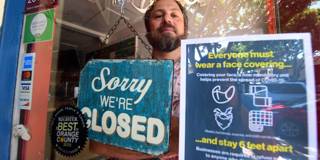As the second wave of the COVID-19 pandemic threatens Europe, governments should induce restaurant, bar, and shop owners to take a paid vacation, rather than ordering them to close. Such a policy promises much lower fiscal and social costs and would be politically far easier to sustain in the tough winter months ahead.
BERLIN – Many European governments are trying to combat the second wave of the COVID-19 pandemic by imposing a “lockdown light,” usually including limitations on the operations of restaurants, bars, and some non-essential shops. The assumption behind these partial closures is that the risk of infection is high when people mingle in closed spaces. A recent paper published in Nature provides further evidence that places like restaurants, gyms, and cafes can play a major role in spreading the coronavirus.
The mandated closures have led to strong popular protests (especially in France and Italy), because they threaten many small shop and restaurant owners’ livelihoods. These sectors were already under pressure from e-commerce before the pandemic, and many marginal operators fear they cannot survive even a light second lockdown. Governments have been trying to help by compensating them for lost income. But in many cases the compensation has been late, partial, and difficult to target at the most economically vulnerable.
Yet, governments might not need to resort to mandated closures if they consider the alternative of taxes or subsidies. Such fiscal measures have so far played no role in so-called non-pharmaceutical interventions to fight the pandemic, even though they could achieve the same social-distancing goals.

BERLIN – Many European governments are trying to combat the second wave of the COVID-19 pandemic by imposing a “lockdown light,” usually including limitations on the operations of restaurants, bars, and some non-essential shops. The assumption behind these partial closures is that the risk of infection is high when people mingle in closed spaces. A recent paper published in Nature provides further evidence that places like restaurants, gyms, and cafes can play a major role in spreading the coronavirus.
The mandated closures have led to strong popular protests (especially in France and Italy), because they threaten many small shop and restaurant owners’ livelihoods. These sectors were already under pressure from e-commerce before the pandemic, and many marginal operators fear they cannot survive even a light second lockdown. Governments have been trying to help by compensating them for lost income. But in many cases the compensation has been late, partial, and difficult to target at the most economically vulnerable.
Yet, governments might not need to resort to mandated closures if they consider the alternative of taxes or subsidies. Such fiscal measures have so far played no role in so-called non-pharmaceutical interventions to fight the pandemic, even though they could achieve the same social-distancing goals.